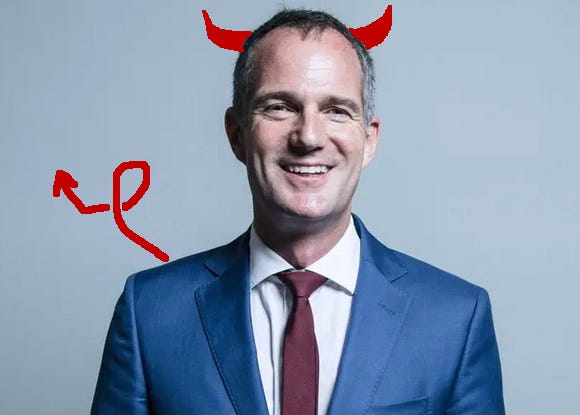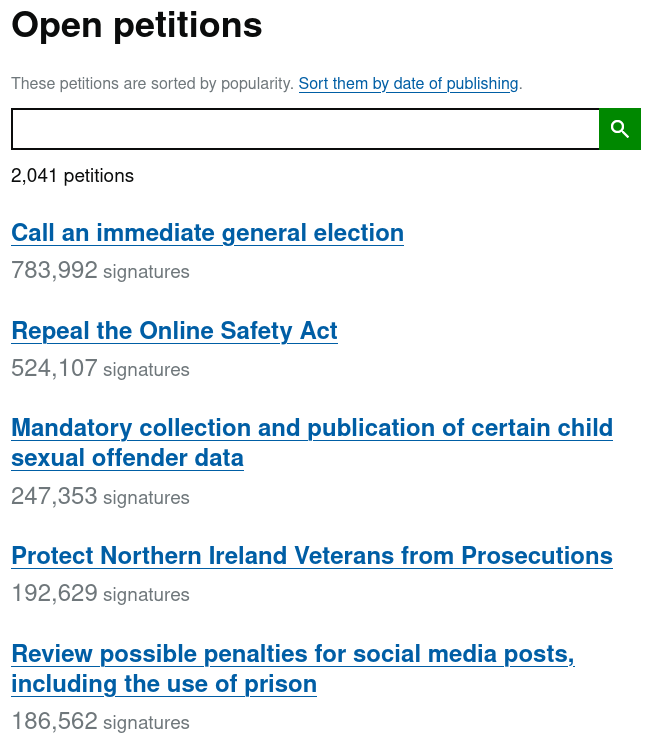Peter Kyle is a peterkyle
pronounced like pedophile
The Online Safety Act
The Online Safety Act is a UK law that was passed in 2023 but has only recently come into force. I did a links post special edition on it recently.
The OSA requires websites to block children from viewing legal content that could be harmful to them. This part recently came into force and users were presented with popups on websites requiring them to prove their age by uploading ID documents. Because of this, the Online Safety Act is deeply unpopular. In response to criticism, the minister in charge of the OSA, Peter Kyle, has accused opponents of being on the side of pedophiles.
So I've decided to invent a new word:
peterkyle /ˈpi: tə kaɪl/ or /ˈpi: də kaɪl/ noun a person, particularly a government minister, who proposes bad internet measures, ostensibly to protect children, and accuses critics of being on the side of pedophiles (named after UK internet minister Peter Kyle)
Here's a picture of a peterkyle:
Indeed the Online Safety Act is so unpopular that a call to repeal it currently the 2nd most popular petition on the UK government's official petition website:
Why the requirement to upload ID is bad
It is irksome to have to upload one's ID to websites in order to view them. Particularly if one is required to do so separately for every website one visits.
My ISP knows I'm an adult anyway (because I pay by direct debit as do most internet users), and I had to contact them to allow them to show me non-child-safe websites. I've already proven I'm an adult so I shouldn't have to again.
Uploading officials documents such as a driving license to random potentially dodgy websites is security risk. I've no control where the data will end up, and it could be used to commit fraud against me.
The government could achieve exactly the same end by requiring websites to label all pages as "safe for children" or "not safe for children". Then, parents could set their kids’ web browsers to not show pages marked unsafe for children. This, incidently, is not a new idea: it's the RSACi proposal from the 1990s.
If Peter Kyle had an IT background, he would probably have heard of RSACi. He doesn't have an IT background. After all we can hardly expect the minister in charge of the internet to know anything about the internet, can we? If Britain was a well run country, ministers would be people with a background in the industry they're in charge of.
So, if it would be possible to implement the child safety provisions of the OSA without infringing people's privacy and potentially leaving them open to fraud, why have they done it this way? And why are other countries proposing similar laws?
The real reason for the Online Safety Act
Why has Britain implemented the Online Safety Act? Why are Australia, the EU and many US states pushing similar laws?
Micro explains why:
It's not to protect children at all, it's to increase the profits of big internet companies like Google, who're pushing for all these laws behind the scenes. Their plan is:
(1) governments make it so you need ID to access the internet
(2) Google set themselves up as an identity provider
(3) Google make themselves an intermediary whenever anyone buys anything online
(4) Google gets a cut of all online purchases
(5) Profit!
Google are too powerful already. This will only make them more powerful. Dumbfucks like Peter Kyle either don't understand that or don't care.
Why it's bad for Google to be so powerful
Because Google is a US company, and by allowing it and other foreign companies to control the internet, the UK is ceding to control of its vital computing and communications infrastructure to foreign state and non-state actors.
The long term result of this is that the UK increasingly becomes a powerless vassal of the USA. Peter Kyle would deny this, but then he's just a stupid peterkyle who doesn't understand the issues and is too incurious to learn about them or care.
Why controlling one's computing and communications infrastructure matters
If country A's computing and communications infrastructure is controlled by entities in country B, then A cannot remain truly independent of B.
To see why this is, consider social media. Imagine that social media in one country is controlled another country. How might the controllers make use of this? Here are some examples:
(1) Kompromat. If you know someone’s secrets you have leverage on them.
(2) Manufacturing public opinion. If you decide what information is presented to a user -- thrugh both outright censorship and, more importantly, newsfeeds that present to them the information you want them to see -- you can make them think what you want.
(3) Passwords. If you control a social media platform, you know people’s passwords on that platform. Most people use the same password on multiple platforms, so you can gain access to them, too. Also, you can impersonate people.
(4) Bulk analysis of data. For example lots of people might move from location A to location B. If they are all members of the same military unit, that’s useful military intelligence. Or if executives from one company are often meeting with executives of another company, some sort of deal or takeover may be on the cards. Intelligence is often gained by piecing together lots of information which on its own isn’t interesting, but when taken with other information becomes a lot more meaningful and useful.
(5) Social graph. If you know all the associates of a person-of-interest, that gives you a bigger attack surface.
Regarding (4) and (5) particularly, I'm sure organisations like the NSA have AI algorithms designed to pick out interesting patterns in the enormous amounts of data they handle.
Similar considerations apply to operating systems and integrated circuits. If you make either, you can put a backdoor in them that exfiltrates data to you or puts the device under your control (for later use). This could be used to damage enemy hardware: for example the Stuxnet worm was used by the USA and Israel to damage Iran's nuclear program.
Since countries generally care about things like sovereignty and independence they might well want to strive to attain it in the computing and communications arena. Thus, any country that wants to be truly independent has to control its computing and communications infrastructure. This includes all layers of the technology stack:
Integrated circuits for example CPUs, graphics and AI co-processors.
Assemblies of circuits such as circuit boards, computers, mobile phones, USB solid-state hard disks.
Operating Systems including versions for servers, desktop/laptop computers, tablets and phones. Ideally there should be an open source OS that has various front ends for servers, desktops/laptops, and tablets/phones.
Network infrastructure, including colocation, internet hosting services, cloud services like AWS or Azure.
Social Media, e.g. Facebook, Twitter, YouTube, TikTok.
Internet-based services and APIs such as Google search, Gmail, Google Maps (and, importantly, its API).
Is Peter Kyle aware of any of this? I bet he isn't even aware a problem exists.
See also
There's also this clip from The IT Crowd:




Okay, so some of these criticisms are reasonable, some aren't. It goes without saying that Google and similar tech companies being too powerful for any government to control is a bad thing - no argument there. (How to regulate Big Tech on the other hand is a trickier issue, and probably something that requires supranational co-operation.)
However, the idea that you can't be fully sovereign if you're reliant on the private businesses of another country - that's just the logic of extreme isolationism. You know how pompous Dan Hannan sounds when he bores on about "sovereignty" - well, that's you I'm afraid. This is especially the case when it comes to the internet - the whole point of which, the reason for which Tim Berners-Lee gave it to the world, was to connect us one human being to another round the globe. It would be redundant and grossly inefficient for every country to have its own walled-garden internet, as well as shrinking our horizons by impeding the global reach which was meant to the internet's USP; added to which, of course, with the enormous head-start Silicon Valley has at this point nobody else is ever going to catch up. Just get real!
Though to be fair, there has been one country that bravely resisted American cultural hegemony, cut off the global Internet and built their own domestic online ecosystem - yes, I'm talking about China. Let's just say that your online experience over there might also have certain privacy issues.